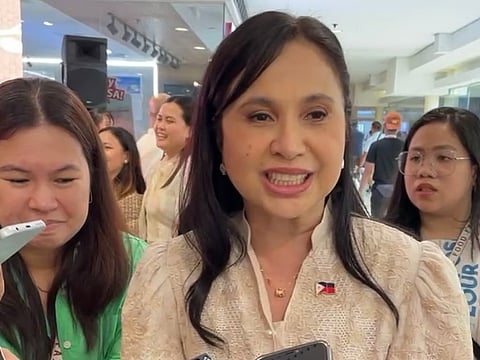
- NEWS
- the EDIT
- COMMENTARY
- BUSINESS
- LIFE
- SHOW
- ACTION
- GLOBAL GOALS
- SNAPS
- DYARYO TIRADA
- MORE

The government assured that despite its support of the planned call for a unified response among Association of Southeast Asian Nations (ASEAN) member states on US President Donald Trump’s sweeping export tariffs, it will not join any trade retaliation.
“There’s no retaliation, we don’t have any of those. We want to deal with this positively,” Trade and Industry Secretary Cristina Roque said in an ambush interview at the sidelines of the opening of the National Food Fair at SM Megamall, Mandaluyong City on Wednesday
On Wednesday, former World Trade Organization (WTO) director general Supachai Panitchpakdi urged Southeast Asian countries to band together to address the US “reciprocal” tariff policy.
Panitchpakdi, who led the WTO from 2002 to 2005 and was Thailand’s deputy prime minister and commerce minister, said that “ASEAN members are likely to suffer serious damage from the US tariffs and are probably not strong enough economically to retaliate by raising their tariffs on US imports.”
Better than peers
The Philippines was slapped with the second lowest Liberation Day tariff of 17 percent, while its neighboring countries, such as Vietnam (46 percent), Thailand (36 percent), Indonesia (32 percent), and Malaysia (24 percent), face significantly higher tariffs.
Malaysian Prime Minister and ASEAN bloc president Anwar Ibrahim said he would seek a united ASEAN response this week to the sweeping reciprocal tariffs announced by the US last week
The Malaysian official said he would discuss the matter with several of his counterparts in the regional bloc, including President Ferdinand Marcos Jr.
Anwar stressed that Southeast Asian countries are among the hardest hit by the new US measures, asserting that the sweeping tariffs mark only “the beginning of greater challenges” in the external economic environment.
Economic team to meet
Roque said the economic team, including her, Finance Secretary Ralph Recto, National Economic and Development Authority Secretary Arsenio Balisacan, and Special Assistant to the President for Investment and Economic Affairs Secretary Frederick Go, will meet today, 10 April, to discuss plans to mitigate the impact of the reciprocal tariffs.
“We just want to discuss the possibilities of strengthening the trade if the US lowers the tariff or how the other countries are reaching out to us to unite to be able to negotiate the imposed tariff,” Roque said.
“But for us, we accept the 17 percent and we’ll see how it goes from there. I need to talk to my (US) counterpart to clear things out. For now, we are not sure, of course, that the US will their tariff for us,” Roque stressed.
Roque still treats 17 percent reciprocal tariffs as an advantage, especially to Philippine banana exports.
“Now that we have much lower tariffs, let’s consider that as an opportunity, particularly our dried mangoes. Our direct competitor for that is Cambodia, which has 49 percent reciprocal tariffs and that’s a major edge for us. Looking at it, we are still in a better place compared to our ASEAN neighbors,” she said.
She said the Philippines will do its best for the US to lower the tariffs, adding that the country remains optimistic about pursuing a US-Philippines Free Trade Agreement with the world’s superpower nation.
“That’s what we want to pursue not only with the US but with other countries such as South America, the Middle East, and Asia for so many products that are in demand that we have. You know, when you do a free trade agreement, we will reap a lot of benefits,” she said.
